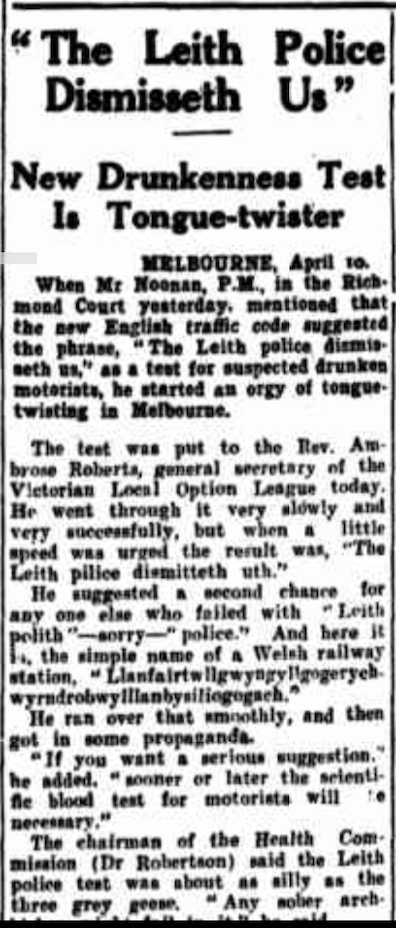As the drinkers exit Burke's pub one of them says, "The Leith
police dismisseth us." Leith is the port district at the
northern edge of Edinburgh, so this comment seems to be
prompted by the Burnsian Scottish dialect just before it:
"We're nae tha fou." But the line comes from a children's
tongue-twister, and Joyce is on record saying that policemen
use it to gauge people's level of inebriation, so it also
comments on the drunkards' situation of having left the safe
confines of the pub and ventured into the late-night streets.
The nursery rhyme, found in Mother Goose collections
(Thornton cites an annotated edition of 1962) goes as
follows:
The Leith police dismisseth us,
I'm thankful, sir, to say;
The Leith police dismisseth us,
They thought we sought to stay.
The Leith police dismisseth us,
We both sighed sighs apiece,
And the sigh that we sighed as we said goodbye
Was the size of the Leith police.
In a letter to the German translator of Ulysses Joyce
remarked that "the police sergeant asks drunks to repeat" the
principal line of this tongue-twister as a test of their
sobriety. The claim seems fantastic, but the 1937 newspaper
article displayed here reports that "the new English traffic
code" suggests using the key phrase "as a test for suspected
drunken motorists," so Joyce's claim that in his time police
were using it to test drunks apprehended on the sidewalks must
be true. The Melbourne official quoted in the article, after
having some fun with the difficulty of the syllables (he
suggests a 56-letter Welsh name as a backup test), opines that
"sooner or later the scientific blood test for motorists will
be necessary."
Some young man in the group of medicals thinks reflexively,
then, of this test that a cop might administer to them on the
streets, and then anticipates botching the syllables: "The
least tholice." I'm cerfectly pober, occifer! All
rightie.... The leeth puhleeth.... The least police....
The leeth puhleeth dismitheth us....
